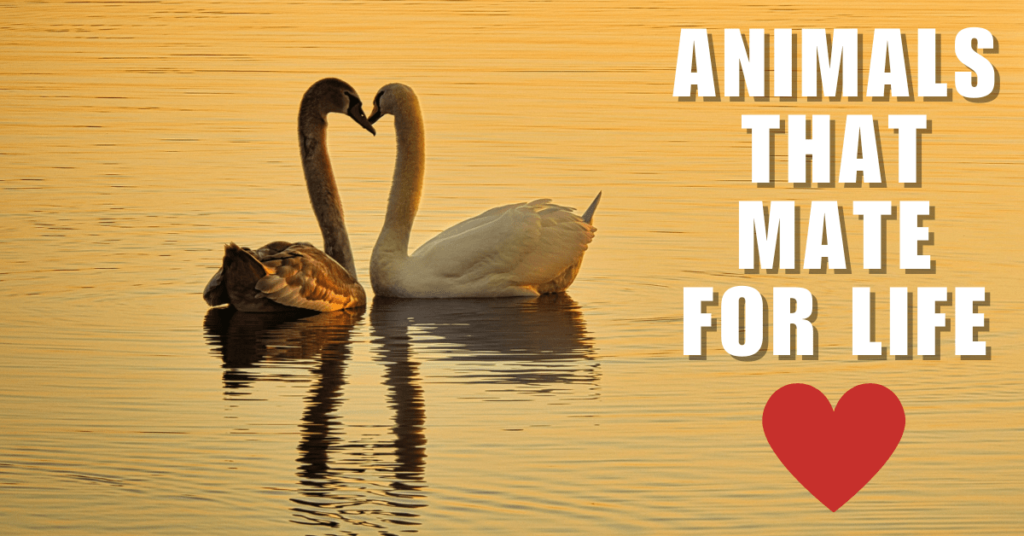Sharks are among the most fascinating and enigmatic creatures of the ocean. One of the biggest mysteries that surround these apex predators is whether they sleep or not. Given their need for constant movement to breathe and survive, many people are curious about how sharks rest. The question “do sharks sleep?” has intrigued scientists and ocean enthusiasts alike. This article aims to unravel this mystery by exploring if and how sharks sleep, as well as examining the unique adaptations that allow them to thrive in the vast and challenging ocean environment.
Don’t forget to take the quiz at the end of this article.
Sharks Sleeping:
Shark Information Table
| Common Name | Shark |
| Scientific Name | Varies by species (e.g., Carcharodon carcharias for Great White Shark, Isurus oxyrinchus for Mako Shark) |
| Family Name | Varies by species (e.g., Lamnidae for Mako Sharks, Carcharidae for Great White Sharks) |
| Type | Fish |
| Size | Head and body length: 1.2 – 7.5 meters (4 – 24.6 feet) Tail length: varies by species |
| Weight | Varies widely: 60 kg (132 lbs) to over 2,200 kg (4,850 lbs) depending on species |
| Size Relative to a 6-Ft Human | Ranges from smaller species that are slightly larger than a human to giants like the Great White Shark, which can be several times larger |
| Diet | Predatory (varies by species: small fish, seals, plankton, etc.) |
| Average Lifespan in the Wild | 20 – 30 years (varies by species) |
| Habitat | Marine environments (coastal areas, open ocean, deep sea) |
| Group Name | School (for some species, particularly young ones) |
| Found In | Worldwide oceans, from shallow coastal waters to deep sea |
| Conservation Status | Ranges from Least Concern to Critically Endangered, depending on species (e.g., Great White Shark is Vulnerable) |
Can sharks sleep while moving?
Yes. Some sharks can glide through the water while one hemisphere of their brain rests, allowing them to breathe and stay alert simultaneously.
Do sharks die if they stop swimming?
Only some. Sharks that rely on ram ventilation, such as the Great White Shark, risk suffocation if they stop swimming, while others like the nurse shark can survive without constant movement.
What Is Sleep in the Animal Kingdom?
Sleep is a fundamental biological process that allows animals to rest and rejuvenate. In mammals, sleep is characterized by a state of reduced consciousness, where the body undergoes restorative processes. This concept of sleep is well understood and involves distinct stages, including REM (Rapid Eye Movement) and non-REM sleep.
Did you know that giraffes have some of the shortest sleep durations in the animal kingdom? Discover how long giraffes sleep and how their fear of predators influences their sleep patterns.
However, when we consider other animals, especially aquatic species, the definition of sleep becomes less clear. Fish and marine animals, such as sharks, have different sleep patterns compared to mammals. For instance, many fish do not experience REM sleep but still enter periods of rest that are crucial for their health.
This diversity in sleep patterns across species means that the way sharks sleep might not align with traditional definitions. So, while we might ask “can sharks sleep?”, the answer is nuanced and requires understanding their unique biological needs and adaptations.
Sharks Sleeping Behavior:
1. The Unique Physiology of Sharks
Sharks are remarkable creatures, not only for their predatory skills but also for their unique physiology. One of the most critical aspects of shark anatomy is their respiratory system. Sharks breathe through specialized gill structures located on either side of their head. These gills extract oxygen from the water as it flows over them.
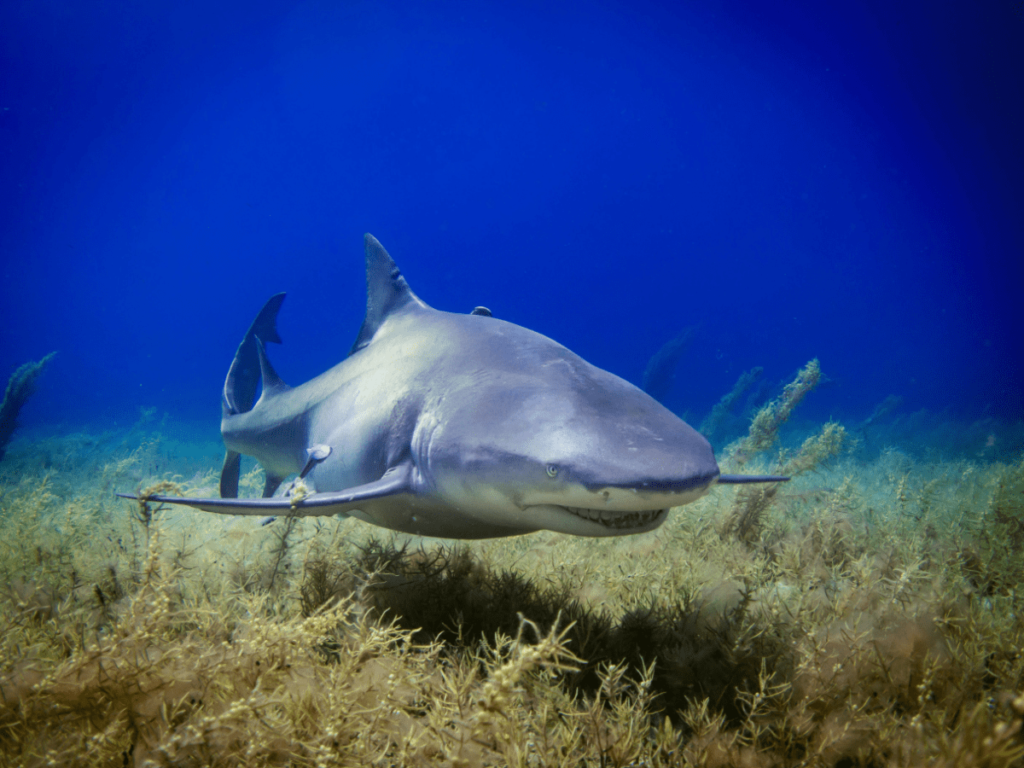
Unlike many other fish, some sharks are known as obligate ram ventilators. This means they must keep moving to ensure a continuous flow of water over their gills to extract oxygen. This constant movement is essential for their survival and has a significant impact on their resting behavior. Understanding “how do sharks breathe” helps explain why traditional concepts of sleep might not apply to these extraordinary animals.
2. Do Sharks Sleep?
The question of whether sharks sleep is more complex than it might initially seem. Traditional sleep, as experienced by humans and other mammals, involves specific stages and is marked by periods of deep rest. However, sharks have evolved differently to adapt to their environment. So, do sharks sleep in the conventional sense?
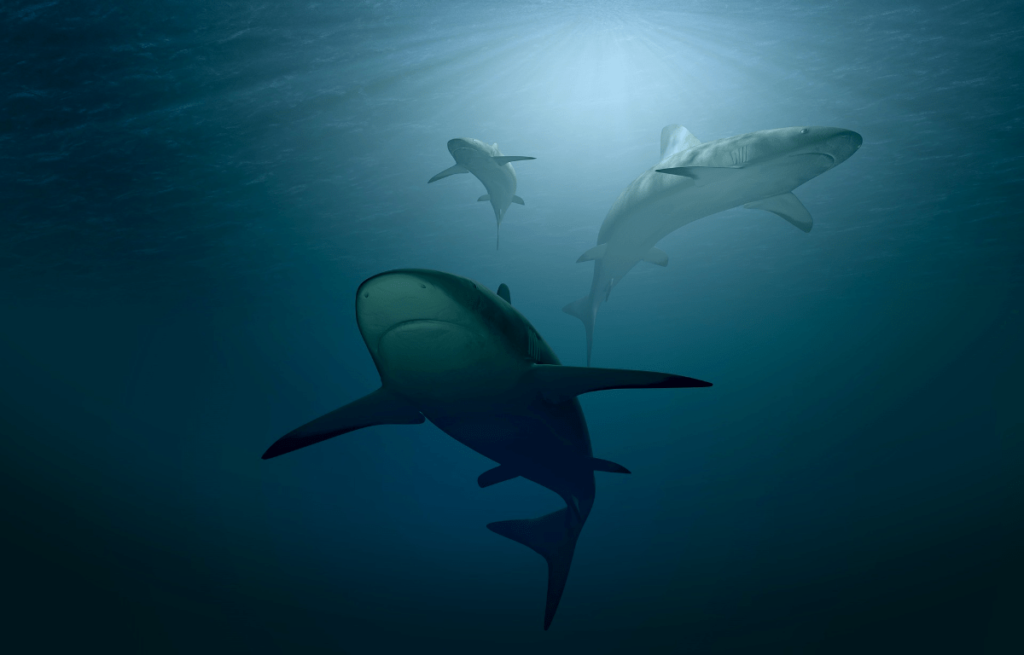
Sharks do not sleep in the same way that humans do. Instead, they have developed unique mechanisms to rest while meeting their physiological needs. Many sharks utilize a form of rest where one hemisphere of their brain is more active than the other—a process known as unihemispheric slow-wave sleep (USWS). This allows them to maintain some level of alertness while still achieving necessary periods of rest.
Thus, while the answer to “do sharks sleep” may not align with the traditional definition of sleep, sharks have evolved effective methods to rest and recover while navigating their aquatic habitat.
3. How Do Sharks Sleep?
Scientific studies and observations have shown that sharks engage in behaviors that suggest resting states. For example, some species of sharks can enter a restful state while slowly moving through the water, allowing them to fulfill their oxygen needs and still rest. These adaptations are crucial for their survival in the ocean’s dynamic environment.
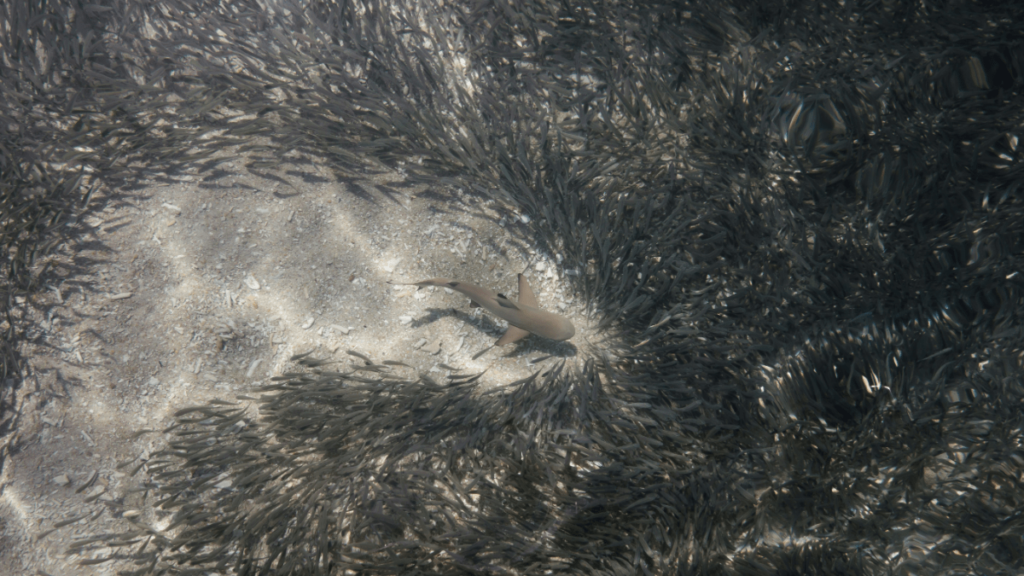
In practice, “how do sharks sleep” involves a delicate balance. Sharks often enter a state of reduced activity, such as gliding slowly through the water or drifting in currents, which allows them to rest while keeping one part of their brain active. This adaptation is crucial, as it helps them manage their energy and stay responsive to changes in their surroundings.
Despite being predators themselves, sharks can’t fully relax due to even more formidable predators in the ocean. Among the most fearsome is the orca, also known as the killer whale. Explore more fascinating facts about Orca – The Ocean’s Apex Predators.
Can sharks rest without swimming?
Yes. Species like the nurse shark use buccal pumping, allowing them to breathe without swimming, enabling them to rest while stationary.
What is unihemispheric slow-wave sleep in sharks?
It’s a unique sleep pattern. This process allows one half of the shark’s brain to rest while the other remains active, ensuring the shark can continue swimming and breathing.
4. Can Sharks Stop Swimming?
One of the most intriguing questions about sharks is whether they can completely stop moving. Many people wonder if sharks have the ability to remain stationary without the risk of dying. The short answer is that it depends on the species.
Some sharks, known as obligate ram ventilators, must continuously move to ensure a steady flow of water over their gills. For these species, stopping movement would mean a lack of oxygen intake, which could be fatal. These sharks are adapted to swim constantly, relying on forward motion to push water over their gills for respiration. Therefore, “can sharks stop swimming” is answered with a definitive no for these species, as they cannot afford to halt their movement.
However, not all sharks are obligate ram ventilators. Some species, like the nurse shark, have adapted to breathe while stationary through a process called buccal pumping. These sharks can actively pump water over their gills even when they are not swimming, allowing them to rest or remain still on the ocean floor.
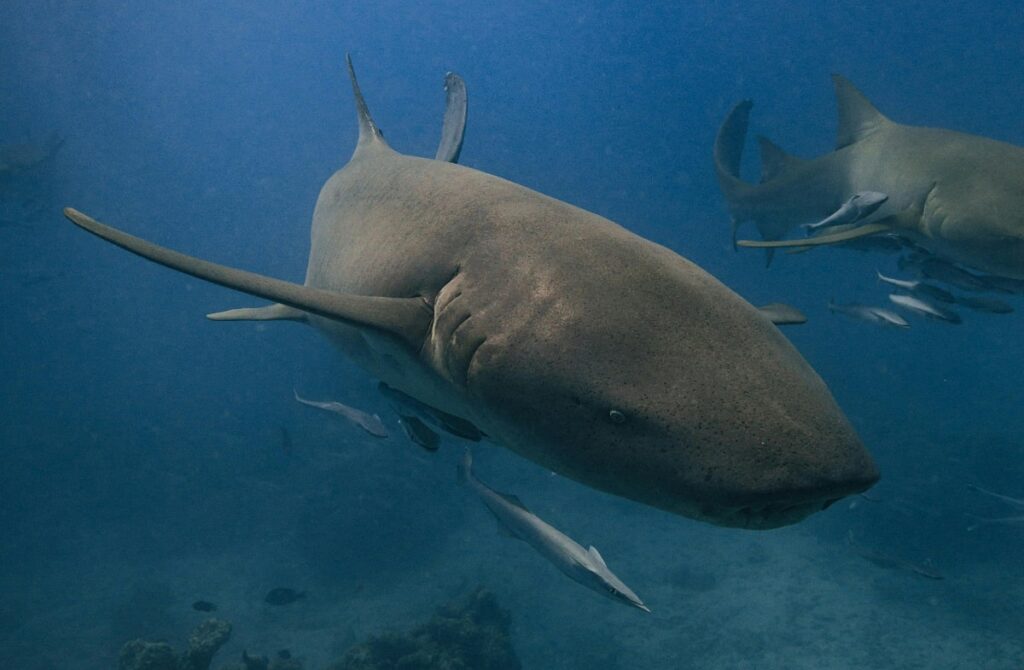
In summary, while some sharks must keep swimming to survive, others can rest or remain still without jeopardizing their oxygen supply. This diversity in respiratory adaptations highlights the remarkable ways sharks have evolved to thrive in their various marine environments.
5. Can Sharks Stop Moving?
The question of whether sharks can completely stop moving is the same as can sharks stop swimming.
Some sharks have developed alternative methods to rest without the need for continuous movement. For instance, the nurse shark is a prime example of a species that can pump water over its gills even when stationary. This process, known as buccal pumping, allows these sharks to rest on the ocean floor or in quiet areas without needing to swim constantly.
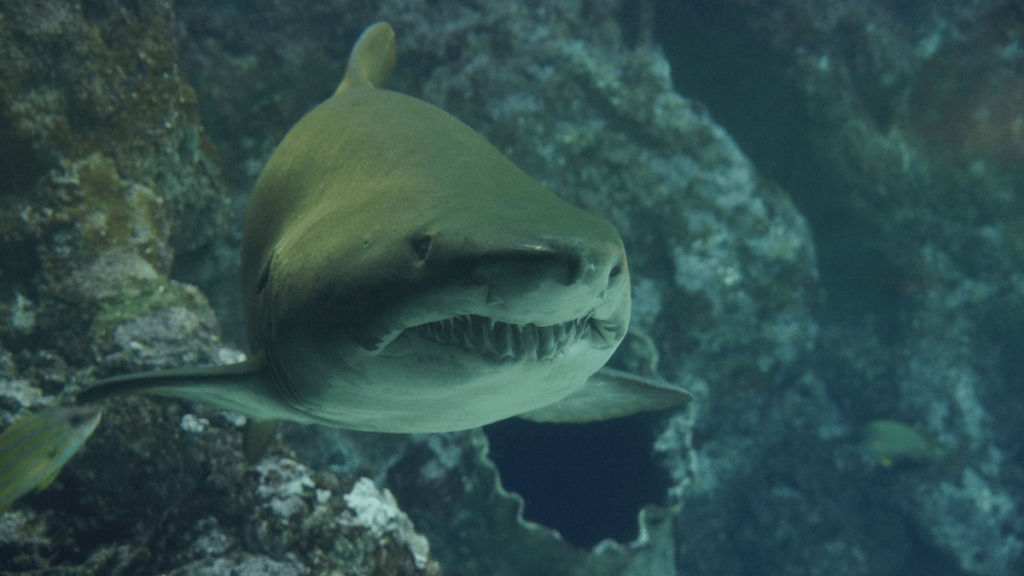
6. Do Sharks Die If They Stop Swimming?
The belief that sharks die if they stop swimming is widely discussed and often misunderstood. This notion primarily applies to species that rely on obligate ram ventilation for respiration. These sharks, such as the Great White Shark and the Mako Shark, must swim continuously to push water over their gills. Without this ongoing movement, they would not receive enough oxygen and could potentially die. Hence, for these species, the answer to “do sharks die if they stop swimming” is yes, they are at significant risk if they stop.
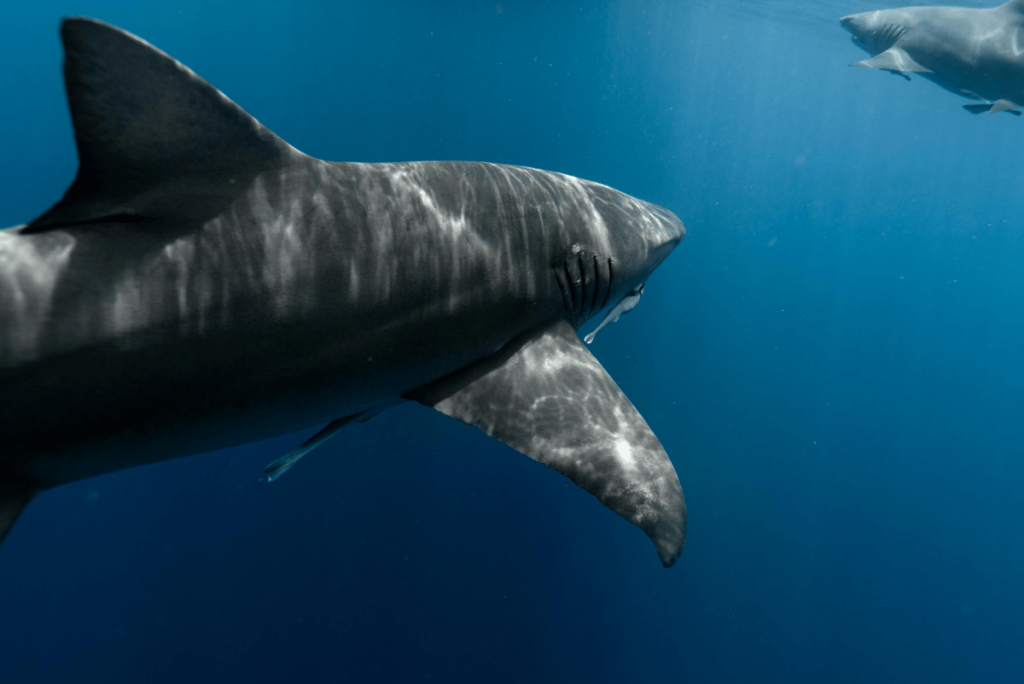
On the other hand, not all sharks depend on continuous movement for breathing. Some species have evolved the ability to breathe while stationary through a process called buccal pumping. Sharks like the nurse shark can actively draw water over their gills without swimming. This adaptation allows them to remain still or rest on the ocean floor, providing them with the flexibility to rest in various environments without the constant need for movement.
7. Shark Behavior Related to Rest
Sharks exhibit a range of fascinating behaviors related to rest, even though they do not sleep in the conventional sense. These behaviors allow them to conserve energy and manage their physiological needs without fully entering a deep sleep state.
One common behavior observed in sharks is slow swimming. Many shark species engage in this slow, steady movement to maintain water flow over their gills, allowing them to rest while still ensuring they get enough oxygen. This slow swimming is often seen in species like the nurse shark, which can use buccal pumping to breathe while moving slowly through the water.

In addition to slow swimming, sharks often seek out quiet areas or gliding currents to rest. For instance, some sharks will drift in ocean currents to reduce the amount of energy needed to maintain forward movement. These currents can provide a gentle flow of water over their gills, allowing the sharks to rest more comfortably while still meeting their respiratory needs.
Overall, “shark behavior” related to rest includes a variety of strategies that enable these predators to stay alert and active even while they are resting. These adaptations are crucial for their survival and illustrate the remarkable ways sharks have evolved to thrive in their underwater world.
Also learn How Shark Teeth Regenerate Thousands in a Lifetime
Frequently Asked Questions
Can sharks swim backwards?
No, sharks cannot swim backwards; their body structure limits this movement.
How fast can a shark swim?
Sharks can swim at speeds ranging from 5 to 40 miles per hour, depending on the species.
Check out the List of 15 Fastest Animals in the world.
How fast can a great white shark swim?
A great white shark can swim up to 25 miles per hour.
How deep can a shark swim?
Sharks can dive to depths of over 7,000 feet, depending on the species.
How shallow can a shark swim?
Sharks can swim in waters as shallow as a few inches, depending on the species.
Will shark teeth move forward?
Yes, shark teeth continuously move forward and replace old ones throughout their lives.
Do great white sharks sleep?
Great white sharks do not sleep in the traditional sense; they have unique resting behaviors.
How fast do mako sharks swim?
Mako sharks can reach speeds of up to 45 miles per hour.
The mako shark is known for having one of the strongest bite forces among animals.
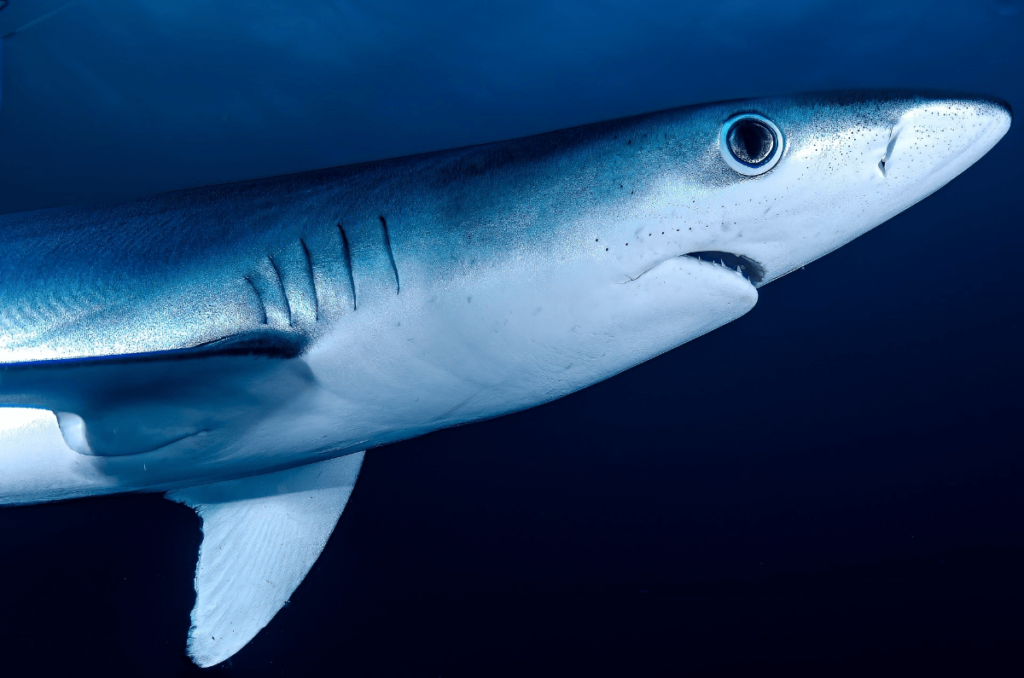
Conclusion
In conclusion, the question of whether sharks sleep reveals the complexity and adaptability of these incredible marine animals. While sharks do not sleep in the traditional sense, they have developed unique methods to rest and maintain their health. Through mechanisms like unihemispheric slow-wave sleep, slow swimming, and seeking out currents, sharks are able to achieve necessary periods of rest without compromising their survival.
The diverse adaptations of sharks highlight their evolutionary ingenuity, allowing them to thrive in a challenging ocean environment. Understanding these behaviors not only enriches our knowledge of shark physiology but also underscores the importance of protecting these essential creatures of the sea.
We encourage you to share your thoughts on shark behavior and sleep in the comments below. If you found this article about How Do Sharks Sleep informative, consider sharing it with friends and fellow marine enthusiasts.
For more fascinating insights into the world of sharks and other wildlife, explore the additional content available on our website. Dive deeper into shark behavior, conservation, and more by visiting our other articles. Share this article with your network, and join the discussion on our social media channels to stay updated on the latest in wildlife research and stories.


